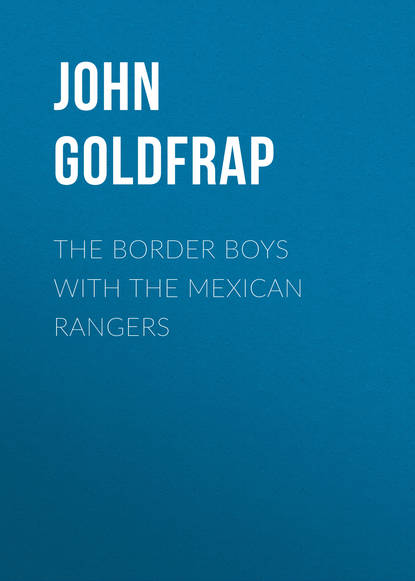По всем вопросам обращайтесь на: info@litportal.ru
(©) 2003-2025.
✖
The Border Boys with the Mexican Rangers
Настройки чтения
Размер шрифта
Высота строк
Поля
But it had been a long night and the lads could hardly keep their eyes open, even their sense of politeness flagging under the leaden feeling that had come into their eyelids. The Don noted this, and at once suggested bed. It was high time, too, as the early sun was already beginning to light up the magnificent grounds about the place, and the boys felt like regular night owls.
Servants in gorgeous livery escorted each lad to a bedroom furnished with the gloomy magnificence characteristic of the Spanish race. But not one of them noted his surroundings as, tumbling into the deliciously cool, clean sheets and sinking into the downy mattresses, they dropped into slumber as profound as it was dreamless.
CHAPTER XIV
EL FIESTA
It was evening before the party reassembled. On arising each member of our party found, neatly folded upon his bed, a complete outfit. Investing themselves in which, they felt more like human beings again. For this kindness the Don would not hear of being paid.
“It is only a small part of my indebtedness to you,” he declared.
After the evening meal that night, which the boys vowed was a starlight breakfast, the Don informed them that the next day being a Saint’s Day and a holiday in the village, he had arranged for a series of sports of the country and a great fete. This was partly in recognition of his gratitude at his daughter’s recovery.
“As you are all good horsemen, possibly you may wish to participate,” went on the Don; “the prizes will be worth competing for. In the lassoing contest the prize will be a double-cinched saddle of Cordovan leather, silver mounted. In a novel game called Tilting the Ring, my daughter has donated as first prize a pair of silver spurs. The second prize in both events will be bridles fitted with silver-mounted bits and appendages. There will be other games, races and so on, but these two contests are the most interesting.”
Of course, this set the boys all agog. Their first rather bashful feelings at the sumptuousness with which they were surrounded, vanished, under the stimulus of discussion of the forthcoming contests. They all, with the exception of the professor, entered for the Tilting the Ring contest, which will be described later, while Coyote Pete and Walt Phelps put down their names as contestants in the lassoing events. Besides these, there were races and jumping contests, in all of which the boys decided to compete.
The next morning dawned fair and still. Jack, on opening the leaded sash of his window, gazed with delight at the landscape below him. Softly rolling hills spread far and near, dotted with park-like groves of trees. Cattle could be seen in the distance, and Jack guessed that they were part of the herds controlled by Don Alverado. At the foot of the hill upon which the hacienda stood, lay the red roofs and white walls of the village, with its cathedral towers rising above the green vegetation which picturesquely was intermingled with the dwellings. Blue smoke ascending into the still air from the chimneys proclaimed the fact that Santa Anita was astir early on the day of the Don’s fete.
Breakfast was a merry meal, and the boys gazed admiringly at the senorita, who looked more beautiful than ever in a white morning gown with a dewy rose stuck jauntily in her black hair.
“Say, she looks like an old Spanish painting, only more so,” observed Jack to Ralph, as, leaving Walt and Pete to look after the stock and the professor to examine the Don’s extensive library, they sauntered off to view the preparations.
“Seems to me you are taking a lot of interest in old Spanish paintings, my gallant youth,” chuckled Ralph with a knowing look.
Jack reddened.
“The Don has a whole gallery full of them,” he said, “and naturally I made comparisons.”
“With the advantage in favor of the living type,” chuckled Ralph; “say, you’re as easy to see through as a spy glass, and – ”
“See here, Ralph Stetson, you shut up or I’ll soak you,” sputtered Jack, looking rather sheepish over his companion’s raillery.
Ralph deemed it prudent to change the subject.
“They certainly do things in style here,” he said, gazing in admiration at the scene of busy preparation which was going forward on the level fields at the base of the hill on which the hacienda was situated. Jack agreed with him. Already a big force of men was at work roping off a course for the sports, and decorating the poles in the national colors.
At one end of the course several peons were erecting a rather tall pole with a swing cross-bar affixed to the top. From this cross-bar depended a cord to which was attached a ring by a snap contrivance. At the other end of the bar hung a heavy bag filled with sawdust. This was for the game of Tilt the Ring, as they were to learn later. Each contestant was required to pass a lance through the ring so skillfully as to remove it from the snap bolt. If he did not succeed it was obvious that the bag of sawdust would swing around and deal him a blow before he could get out of its reach.
“Looks like a bully game,” opined Jack, after the two boys had asked some questions of an English-speaking peon, “but what happens to you if the sack hits you?”
“Maybe stick on. More maybe you fall off,” grinned the man.
“Humph,” grunted Ralph, “I don’t know so much about that game. Looks pretty strenuous to me.”
Soon after, they visited the stables where Coyote Pete and Walt already were. Coyote had his lariat out, stretching it and getting it supple and ready for the afternoon’s test, for the sports were to commence after the midday meal. Walt was rubbing the knees of his horse with care. Firewater and Petticoats, – for Ralph had given his new pony the old name, – whinnied as Ralph and Jack entered, and their glowing eyes and shiny coats showed that they were in fine fettle. In a stall by them stood the horse they had appropriated from the outlaws. It was a fine beast, somewhat heavy, perhaps, but strongly limbed and sinewed.
“I’ll bet Ramon would give a lot to have that horse back,” observed Jack, gazing at the beast admiringly.
“Yes, considering that we chose him in the dark and in such a hurry, I don’t think we made a bad choice,” was Walt’s rejoinder.
The boys ate sparingly at noon day, despite the variety and splendor of the dishes set before them. They felt that they were the representatives of America at the games, and that it would not do to risk a tummy-ache or any other uncomfortable feeling. Ralph, however, eyed the various dishes longingly, having, as we know, a fastidious appetite. But Jack’s whispered, “You’re in training,” was enough to keep him to the agreement they had made before luncheon.
“I will have your horses saddled for you and brought round,” said the Don, after the conclusion of the meal. He was preparing to give the order to a servant when Jack interposed.
“Without meaning any discourtesy, Don Alverado,” he said, “we would rather saddle up Ourselves. You see – ”
“Say no more, say no more. It shall be as you wish,” said the Don, but it was plain to see that he was rather nettled over the Americans’ independence.
“You see,” Jack explained to his chums later, as they wended their way to the stables, “the lower orders of Mexicans have no love for Americans, and they are capable of putting up any tricks on us. I don’t say that they would, but then again it’s best to be on the safe side.”
A chorus of assent greeted this. It did not take long to saddle up, the necessary trappings being among the gifts which Don Alverado had insisted on showering on the saviors of his daughter. The party had protested that they were well able to pay their own way, but the Don would not hear of it.
“We do not treat our guests thus, in Mexico,” he said, “and you, of course, know that the hospitality of the old dons of Spain was proverbial.”
The Americans made a fine-looking cavalcade as they rode at an easy trot down to the field where the contests were to be held. All wore sombreros, held under the chin by a strap of rawhide. Riding trousers of the loose, Mexican style, red sashes and short jackets completed their attire. It was in fact only by their clear, cleanlooking skins and erect bearing that you could have told they were not of the Spanish race.
A large crowd had already gathered when they reached the “lists,” as the scene of the contests might be called. People came in costly carriages with great C-shaped springs, in humbler vehicles, and in back-country burro carts. From the town a great procession streamed out on foot, and everywhere there were Caballeros dashing about on fiery horses, riding with the reckless abandon of the Mexican horseman.
“We’re up against a likely looking lot of horsemen,” said Ralph, as they came in full view of the gay scene.
“We’ll have to do our best,” said Jack simply, “the more skilled our opponents are, the more credit it will be to us to defeat them if we can.”
In a corral some distance off were the cattle that were to be used in the lassoing contests. A curious crowd was gathered about them expatiating on their good points. All at once a band broke out into the Mexican national hymn as the Don and his daughter, accompanied by a party of guests, rode up to their seats in a small stand, protected by a striped awning, placed immediately opposite the tilting ring apparatus.
“Gee whillakers, it’s hard to believe that we’re in the twentieth century, ain’t it?” asked Coyote Pete, as he gazed about him.
“It’s like Don Quixote,” cried Ralph, quite carried away by the shifting pictures of color and life on the greensward about them.
“Donkey who?” inquired Coyote Pete, whose reading in the classics had not been extensive.
“Oh, a certain old gentleman in Spain whose specialty was going about rescuing beautiful maidens and getting into trouble.”
“Wall, that seems to be us,” observed Pete dryly. “But look, the Don is announcing the first contest. It’s the race to the town and back agin, carrying a letter to the city hall, or whatever they call it, and returning with an answer. Whoever makes the best time wins a fine horse blanket and a silver-mounted quirt. Any of you boys in it?”
“No, I want to keep my mount fresh for the tilting,” said Jack.
“Same here,” announced the others.
They watched the contest with interest, however. It was won by a small Mexican on a wiry little animal who sped into the town and back in seemingly incredible time. As soon as he could escape from the congratulatory crowd, the wiry little horse was spurred toward where our friends stood in a group waiting for their contests to be announced.
“For you I have the letter,” he said, as he rode up and extended a bit of paper.
“A letter for us. Impossible!” exclaimed Jack. “Who could have sent it?”
“It’s addressed ‘Senor Jack Merrill,’ sure enough,” cried Ralph, “and the address is printed, too.”
“Somebody trying to disguise his hand,” commented Jack, taking the note. “Well, let’s see what it is, any how.”











